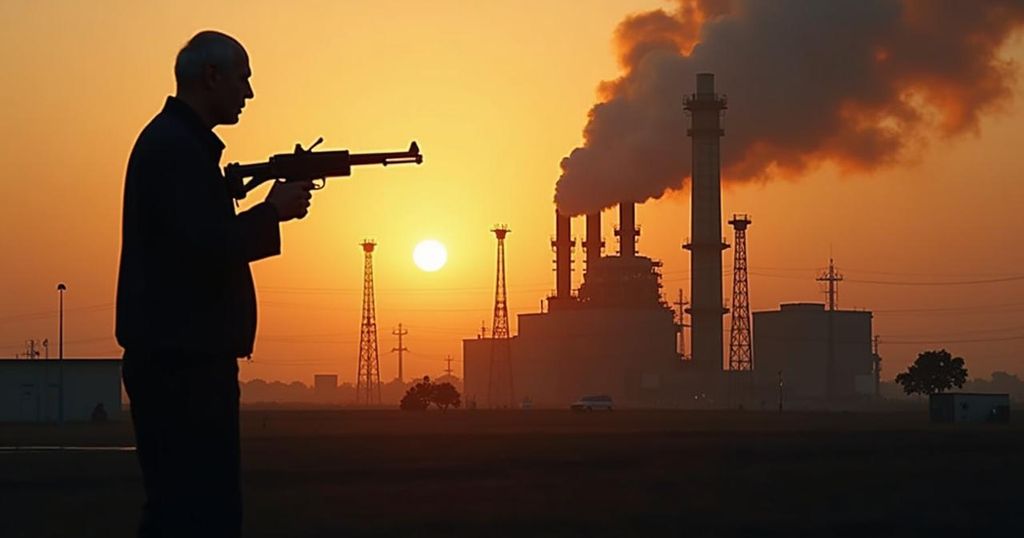Biden Opposes Israeli Strikes on Iran Reflecting Complex Regional Tensions
President Joe Biden has publicly opposed any Israeli strikes on Iran’s nuclear sites in response to Iranian missile attacks on Israel, asserting that any retaliation should be proportionate. His comments come amid rising regional tensions, with experts warning of the potential for increased Israeli military action given the current context, alongside coordinated discussions among G7 nations regarding sanctions against Iran.
Recently, President Joe Biden expressed his opposition to any Israeli military strikes against Iran’s nuclear facilities in light of the recent missile barrage launched by Iran towards Israel. When questioned about potential retaliation, Biden’s unequivocal response was, “the answer is no.” This statement was made following Iran’s attack involving approximately 180 ballistic missiles aimed at Israel, marking the second such incident since April. In the aftermath of this attack, Israeli Prime Minister Benjamin Netanyahu vowed that Iran would face repercussions, though the missile strike did not lead to significant casualties in Israel, resulting in the death of one Palestinian in the occupied West Bank. Experts have raised concerns that Israel may respond by targeting Iran’s nuclear program, which has long been a focus for Israeli leadership. Ali Vaez, the Iran Project director at the International Crisis Group, noted the heightened risk of Israeli action given the perceived fragility of Iran’s defensive network, especially involving Hezbollah forces. Furthermore, he highlighted that the current circumstances could present Israel with a unique opportunity to address a long-standing threat. In contrast, Former Israeli Prime Minister Naftali Bennett emphasized the necessity for Israel to act swiftly to annihilate Iran’s nuclear capabilities, insisting that Israel possesses both justification and the means to do so. In light of recent events, President Biden reiterated the United States’ commitment to supporting Israel, advocating for a “proportional” response to any Iranian aggression. He asserted that all G7 nations share this perspective. Furthermore, discussions among G7 leaders included considerations of new sanctions against Iran, emphasizing a united front among allied nations. The geopolitical landscape remains precarious, with Iran claiming its missile strikes were aimed at Israeli military objectives in retaliation for the targeted assassinations of key Iran-aligned figures, such as Hamas leader Ismail Haniyeh. Both nations are on high alert, with Iranian leadership warning of severe consequences should Israel choose to retaliate. Analysts suggest that the ongoing tensions, amidst the conflict in Gaza and Lebanon, could trigger a broader regional conflict, posing risks that extend far beyond their borders. Political analyst Marwan Bishara remarked that the confrontation between Iran and Israel, especially under U.S. influence, would have far-reaching repercussions throughout the Middle East.
The recent tensions between Iran and Israel have escalated significantly following Iran’s missile attacks on Israel, which are perceived as retaliatory actions linked to the assassination of Iranian-affiliated leaders. Israel, under Prime Minister Netanyahu, has historically viewed Iran’s nuclear ambitions as a pivotal threat and has considered military action against Iran’s nuclear facilities as a viable option. In this context, President Biden’s comments underscore the complexities of U.S. foreign policy, balancing support for Israel while attempting to cool potential retaliatory actions that could spiral into a larger conflict. The backdrop of ongoing warfare in Gaza and Lebanon adds another layer of urgency and anxiety to the situation, with both countries bracing for possible military engagements.
In conclusion, President Biden’s firm stance against Israeli military strikes on Iran’s nuclear sites emphasizes the need for a measured approach to escalating tensions in the region. His advocacy for a proportional response, coupled with the concerns voiced by analysts, highlights the precarious nature of the current geopolitical landscape. With both nations on alert and considering their next moves, the situation remains volatile, posing risks of broader conflicts that could engulf the entire Middle East. The UN and allied governments will need to carefully navigate these dynamics to prevent further escalation and promote stability in the region.
Original Source: www.aljazeera.com




Post Comment